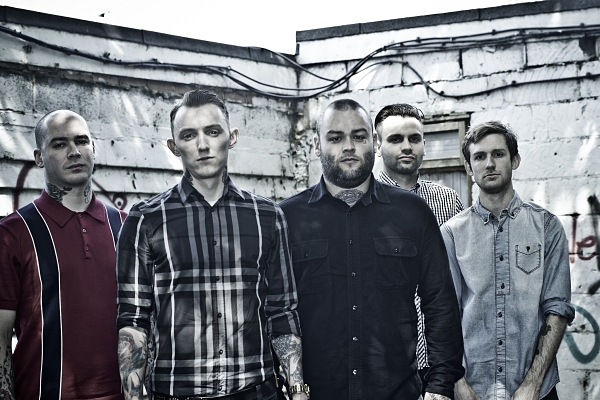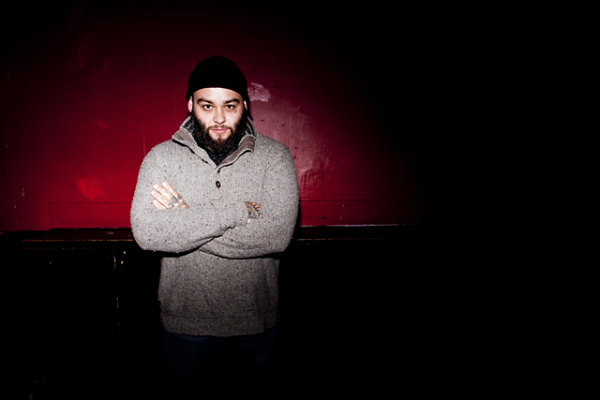
Consider this a warning: GALLOWS are not the same band they used to be. A familiar face may be in command of the microphone now but the Watford outfit are on a different wavelength, that through speed, precision and vein-twisting tempos, is more of an ode to hardcore punk than most albums you can find on a shelf rather than your parents’ basement. With their September release being an obsession with razor sharp teeth, we caught up with vocalist Wade MacNeil at their recent Toronto show to discuss what it was like adjusting to his first American tour with the group and why the 28-year-old veteran couldn’t care less about today’s disjointed punk rock community.
_________________________________________________________________________________________________
Regardless of where life takes you, one should never forget where they came from. Do you feel a sense of home when it comes to playing in Toronto?
Yeah, Toronto feels more like home than St. Catherines does, very much so. I’ve lived here for the past five years and I’ve also played more shows here than anywhere else. It’s where all my friends from around the country have ended up, and it very much feels like home.
Will you be able to translate that familiarity back to the rest of the group tonight?
I think so. I’ve been showing them around and we went to Sneaky Dees the other day. They’re already getting into it.
Given your history with various Canadian punk/hardcore bands, was it difficult finding a stable middle ground between yourself and the rest of Gallows?
Not really because what they wanted me to do was be myself. They grew up listening to North American hardcore – it was what they liked the most – and I’ve always liked 70’s UK punk, like The Clash and The Damned and all that kind of stuff. So I think they’re excited about the way my voice sounds, and I feel like in a strange way I’ve become part of that UK history as well. It’s cool, everybody wins!
It sounds like everyone has a positive outlook; would you say it was easy adding your perspective to a band that had already built a solid foundation for themselves?
It definitely took me a little while to navigate my way through it and figure out how I wanted to do it. But there were some things I immediately knew were going to stay the same, like playing like our lives depended on it everyday.
In my opinion, on previous records Gallows had a very nihilistic attitude towards stuff, and that’s just not me. I’ve always liked that violence and that attitude of punk music, but I’ve always liked the approach that everything is chaos and everything is falling to pieces, so for us, it became how do we change that? I think Gallows did a good job about saying how everything is shit on their two previous records, and I fucking love that, but the new stuff talks about what’s wrong with the world and yet through that negativity we still ask, “where’s the change?”.
How did the self-titled album bring the five of you together?
I think what really brought us together was jumping in there so quickly. They asked me to join, I said “yes” and two weeks later we were in California making an EP. A week after that, we were doing a six-week American tour and aside from the Toronto and Montreal shows, it just wasn’t the right crowd for Gallows. We were playing with a lot of pop punk bands and people were just not feeling us at all. We’d go across the street to the bar in whatever city, and a bunch of people would ask us “What are you guys doing on this tour? We’d come to the show, but we’re just not going to!”. People reacted that way on the whole tour.
That trial by fire really brought us together and convinced us to want to do this and make it work. After that tour we went to the United Kingdom, and we weren’t really sure what to expect, so I was definitely stressing out. The London show was the craziest Gallows show; if not the best then it was definitely in the top three. We walked off stage that night and we just knew it was on and that we were going to be okay. It could have gone any other way after that first tour, but when we came off stage in London, no one had to say it. We just knew.
Did the self-titled album set a clear focus on how to approach hardcore music?
We knew what we wanted to do and we wanted to make something that was really heavy without following the clichés of heavy music – like big production and big guitar sounds. We’re playing the songs as fast as we can, it’s all down picked; it not over thought, it’s not perfect, and I think that’s why the record sounds the way it does. We set out trying to do that and we made the record we wanted to, and that doesn’t happen all the time. Sometimes when you go into the studio, things change but we came out making the record we’ve all always wanted to make, and that’s why we made it a self-titled one.
What do you think of hardcore music’s evolution over the past 12 months?
I don’t care about hardcore music, I don’t care about punk music and I don’t like people, by and large, who like it. I really hate when people talk about it endlessly and I generally feel like I have nothing in common with people at the shows. That being said, I love the music.

Why do you have nothing in common with people who go to those shows?
Probably everyone says this and I’m sure guys ten years older than me would say the same thing about people my age, but I feel like the sense of community is gone, and that’s what attracted me to the scene in the first place. My friends and I all found each other because we were weird; we were freaks, and not in a positive way, and nobody liked us. I don’t feel that camaraderie at shows anymore. They no longer have that kind of atmosphere that would draw you into going to another one. The people who I like are the ones who are there just because they really like the music. If I was a young person now, I don’t think I’d get caught up in this scene. I don’t think I’d want to spend my money on shows and I don’t think I’d want to play music. If I was born in 1994, I don’t think I’d be playing in a band.
I’m a few years younger than you are, but I can definitely remember feeling a much stronger sense of community at punk shows that I went to when I was younger.
A good scene still exists in some places. In Europe there is still a better community aspect there, but in North America…it’s a weird feeling. When I first joined the band, we were on tour in the states and we played in Chicago the same night as this Norwegian band called Kvelertak – they’re like if AC/DC was a D-beat band and they’re unbelievable – and since we’ve played with them a bunch, they came out to our show. At one point, I was talking to Marvin, who’s a Viking of a guy and tattooed up to his eyeballs, and we were sitting by the Gallows merch table, having a beer and getting vibe’d up by these 14-year-old pop punk kids who were looking at us like we were dorks.
They were making me feel like I was in high school or something like that, and I just thought, “I don’t know why I’m here, I don’t know why you people are here”. Later that night, we went across town to see Kvelertak play at this place called The Empty Bottle that had a bunch of old long-hairs and it was the most welcoming environment ever. It was funny to think that the Kvelertak/Skeletonwitch/Gaza show was a more welcoming environment than the pop punk show, but hey (laughs). I’m starting to sound like a bit of a crotchety old man! “Back in my day!” (laughs).
Do you think listeners will ever strengthen their attachment to this genre?
I don’t know if I care what they do with the genre. I would hope that people love what we do because we try to be honest with the music we make. We made this record incredibly selfishly, which I think is how all of the best records are made and it’s a record we would want to hear and a record that we want to play live. I hope people love it, I really hope they do, and I hope it inspires them to start bands of their own.
How important is passion and enthusiasm to what you do?
I think a band can exist without those two things but it is completely integral to what I do. There are a lot of easier ways to live and easier ways to make a living where you don’t have to put your life on hold and be away ten months of the year, but for me – if I wasn’t passionate about it, I wouldn’t be doing this. I do this because I feel like there’s nothing else I can do. Not in the respect that I can’t do anything else but I just can’t imagine my life without music in it. It’s what makes me get out of bed in the morning and it’s what inspires me, so this is amazing for me. I’m sure some bands can do music without passion, but I would not recommend it.